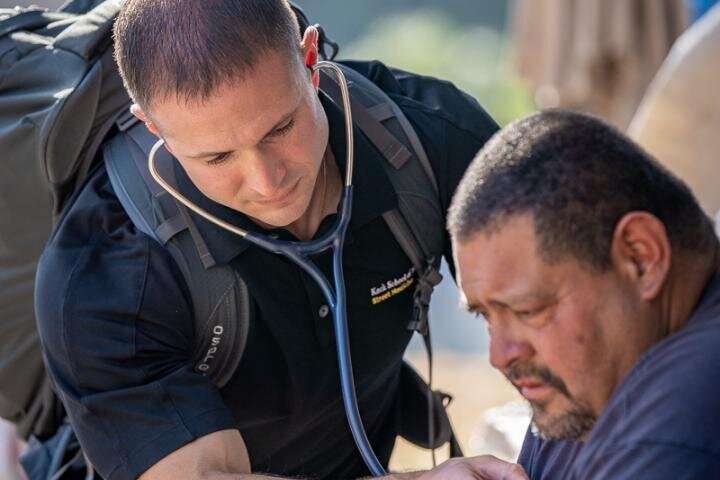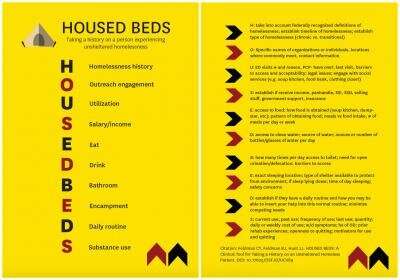Researchers develop new information tool to standardize clinical outreach to unsheltered homeless

Researchers from the street medicine team at the Keck School of Medicine of USC have developed "HOUSED BEDS," the first published tool designed specifically to help outreach teams clearly assess the situation of unsheltered homeless patients. This memory-prodding acronym can help clinicians ask high-yield questions and gather vital information necessary to providing quality care tailored to the needs and lifestyles of patients living on the street.
"An important first step in helping homeless patients is to clarify the social, mental and physical challenges they face living on the street that can vary drastically between individuals," says lead researcher, Corinne T. Feldman, MMS, PA-C, clinical instructor of family medicine at the Keck School. "HOUSED BEDS empowers clinicians and students to incorporate information like access to sources of clean water, food and other services into a homeless patient's medical history."
"HOUSED BEDS" stands for:
- Homelessness: Patient's history of homelessness
- Outreach: Who else is providing services
- Utilization: How patient uses health care, social services and judicial system
- Salary: Kinds of financial resources
- Eat: Sources of food and access to it
- Drink: Sources of clean water and access to it
- Bathroom: Access to toilet
- Encampment: Sleeping environment
- Daily routine: How to minimize competing priorities
- Substance use: History of usage
This acronym is designed to spur clinicians to ask questions they may not have been trained to ask, which can reveal issues that directly impact a patient's health.

"Developing an effective treatment plan depends on a complete and accurate patient history," says , clinical assistant professor of family medicine and director of street medicine at the Keck School. The street medicine program administers care to homeless individuals in Los Angeles County, which is home to nearly 45,000 unsheltered individuals. "Even patients in traditional clinic settings omit information, sometimes unintentionally, that could be relevant to a diagnosis, so it's important for outreach teams to have a means of understanding each homeless individual's unique situation," he adds.
Understanding the people behind the numbers
- In the , volunteers found 58,936 people experiencing homelessness in Los Angeles County—a 12% increase over the last year. Countywide, 75% (44,214 people) were unsheltered.
- The City of Los Angeles counted 36,300 homeless people, a 16% increase from last year. Of those, 27,221 were unsheltered.
- In Los Angeles County, the number of people experiencing chronic homelessness, defined as being homeless for 12 consecutive months or on at least four separate occasions in the last three years totaling at least 12 months, increased 17%, from 14,075 in 2018 to 16,529 in 2019. Of these, 1,991 had some form of shelter, but 14,537 were unsheltered.
More information: Open Science Framework,
Provided by University of Southern California
















